new-B-LESSON 8
新概念英语青少版入门级B课本整理
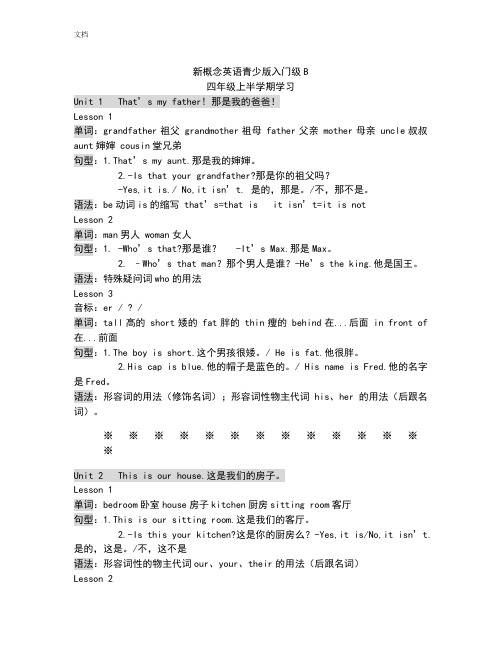
新概念英语青少版入门级B四年级上半学期学习Unit 1 That’s my father! 那是我的爸爸!Lesson 1单词:grandfather祖父 grandmother祖母 father父亲 mother母亲 uncle叔叔aunt婶婶 cousin堂兄弟句型:1.That’s my aunt.那是我的婶婶。
2.-Is that your grandfather?那是你的祖父吗?-Yes,it is./ No,it isn’t. 是的,那是。
/不,那不是。
语法:be动词is的缩写 that’s=that is it isn’t=it is notLesson 2单词:man男人 woman女人句型:1. -Who’s that?那是谁? -It’s Max.那是Max。
2. –Who’s that man?那个男人是谁?-He’s the king.他是国王。
语法:特殊疑问词who的用法Lesson 3音标:er / ? /单词:tall高的 short矮的 fat胖的 thin瘦的 behind在...后面 in front of 在...前面句型:1.The boy is short.这个男孩很矮。
/ He is fat.他很胖。
2.His cap is blue.他的帽子是蓝色的。
/ His name is Fred.他的名字是Fred。
语法:形容词的用法(修饰名词);形容词性物主代词his、her的用法(后跟名词)。
※※※※※※※※※※※※※※Unit 2 This is our house.这是我们的房子。
Lesson 1单词:bedroom卧室house房子kitchen厨房sitting room客厅句型:1.This is our sitting room.这是我们的客厅。
2.-Is this your kitchen?这是你的厨房么?-Yes,it is/No,it isn’t.是的,这是。
新概念二Lesson 8
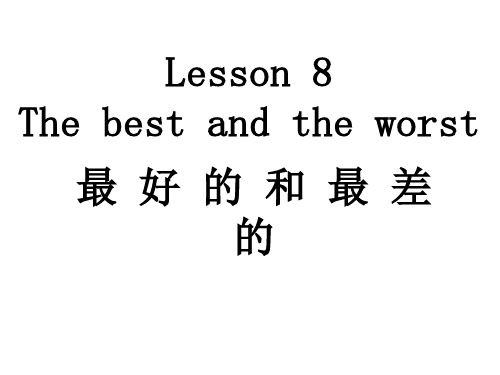
Listening
1. Does the writer live in the same town
as
Yes ,he does.
2.JHoaes JoSeagontdaegrarsd?en?
Yes, he has.
3. Is his the most beautiful one in the town? Yes, it is.
Lesson7短语和Lesson7重点句子 (后3句)签字。
Text
Joe Sanders has the most beautiful garden in our town. Nearly everybody enters for ‘The Nicest Garden Competition’ each year, but Joe wins every time. Bill Frith’s garden is larger than Joe’s. Bill works harder than Joe and grows more flowers and vegetables, but Joe’s garden is more interesting.
He has made neat paths and has built a wooden bridge over a pool, I like gardens too, but I do not like hard work. Every year I enter for the garden competition too, and I always win a little prize for the worst garden in the town!
代词 ) 不用 for
四年级下英语优质教案-Lesson 8 In the Bathroom(EEC)

教学重点
living room/ with/ where/ work/ watchTV
教学难点
I’m doing sth. He is doing sth.
教学准备
预习要求
Some cards.Tape and recorder.
Let me get it, dad.Ilike spiders.Idon’t like spiders.
能力目标:To learn how to read the passage and understand the meaning of the main points.
德育目标:To be tidy and form a good life habit.
Listen and learn .
Listen to the tape and pay attention to the new words .
Answer thequestions
Look at the picture .
Listen to the tape carefully .
Talk about what happened .
Give the explanation of the title. Then give the tape. Ask student to answer then give the keys.
What are you watching?
Lead- in :
Who is watching TV?
Is ken watching TV?
Listen to the tape and learn the dialog .
新概念英语青少版入门级BUnit~Unit课文

新概念英语青少版入门级B重点单词与句子Unit 1 That’s my fatherLesson 1HelloHello Is that your mum No, it isn’t. That’s my aunt. And that’s my uncle.Is that your grandfather Yes, it is. And that’s my grandmother and my cousin.Woof Woof Look That’s my mother Hello, Mum OhThat’s my father. Hi, Dad Don’t be sillyLesson 2Who’s that manHe’s the king.Who’s that womanShe’s the queen.Who’s thatOh, no It’s MaxLesson 3‘Who’s that boyHe’s tall and thin. His T-shirt is blue and his cap is green.’‘That’s my brother. That’s Tom.’‘Who’s that woman behind Tom She’s short and fat.’‘Sh Be quiet That’s his teacher’Unit 2 This is our house.Lesson 1This is our house .Welcome ThanksIs this your kitchen Yes, it is. Lucky dogThis is our sitting room. Very niceIs that their bedroom Yes, That’s their bedroom.This is fun This isn’t funLesson 2Where’s PopHe’s in our house. He’s in the dining room.Our sitting room is next to the dining room. And our dining room is between the kitchen and the bedroom. Very nice But where’s your bathroomLesson 3My name’s Mike. That’s my sister, Emma, in front of our house.In our house ,the kitchen is next to the dining room.The sitting room is between a bid bedroom and a little bedroom.Look at my mum and dad They ‘re in their bedroomTheir bedroom is big and yellow.My bedroom is little and blue.Unit 3 Get off the bed.Lesson 1There’s a big bed in my bedroom. There’s a lamp next to the bed. Kim Get off the bedThere’s a desk and a chair in my room. Oh There’s a computer. There isn’t a computer in our bedroom.Look There’s a poster. It’s a panda. And there’s a doll on the shelf.Kim Get off the bed Oh Ha HaLesson 2Is there a door No, there isn’t.Is there a window in this house No, there isn’t.Yes, there is Look at the wallLesson 3That’s my bedroom My bed is big. It’s between the door and the window. There’s a little table next to my bed. There isn’t a desk. There’s a shelf behind the table. There’s a lamp on the shelf. Look at my frog It isn’t on my bed It’s under the chair.Unit 4 It’s time for lunch.Lesson 1Good morning, Dan It’s eight o’clock. Oh It’s morning. It’s time for breakfastIt’s one o’clock. It’s time for lunch Very nice A boneIt’s six o’clock. It’s time for supper. YummyIt’s ten o’clock. It’s time for bed. Good night, Dan Good night A great day Thanks, RobertLesson 2What time is it It’s eleven o’clock. It’s time for breakfast.What time is it It’s twelve o’clock. It’s time for lunch.Pop It’s nightLesson 3“Mum, where are you ’‘I’m in the kitchen.’‘What time is it, Mum ’‘It’s one o’clock. It’s time or lunch’‘What for lunch, Mum ’‘A chop and salad. Sam, here you are’‘Yummy And an apple ’‘Yes, an apple’‘Thanks, Mum’Unit 5 That’s Ted’s puppet.Lesson 1Look at this bedroom What a mess Look That’s Ted’s puppet. Yes And this is Anna’s skipping rope.This isn’t Ted’s skateboard. No, that’s Robert’s skateboard. And this is my game.This is Ted’s spaceship. This is his boat. Is this Anna’s puzzle Oh, dearWhat’s thisIt’s Kim’s bone. Oh There it is HurrayLesson 2Whose Frisbee is it It’s Pop’s. It’s Max’s.Whose football is it It’s Pop’s. It’s Max’s. OK Thank you for this Frisbee and football.Lesson 3My name is Mark. My favourite toy is a spaceship. My sister’s name is Joan. What’s her favourite toyNo, it isn’t a doll. It’s a puppet. The Puppet’s name is Pip. It’s a clown. My brother’s name is Tommy. His favourite toy is a boat. There’s a big toy in our sitting room. Whose toy is itIt isn’t my mum’s. It’s my mum’s. It’s my dad’s. It’s a computerUnit 6 This is my uncle’s farm.Lesson 1This is my uncle’s farm. It’s great Look These are chickens. These are goats.Look at the birds Those are ducks.These are little horses. These aren’t horses. These are donkeys.Those are sheep. Those aren’t sheep. Those are lambs.Lesson 2Are these cows Yes, they are.Are those cows No, they aren’t.They’re bulls HelpLesson 3This is our farm. It’s a big farm. Look there Those are our sheep. Those are cows next to the sheep. And those are bulls in front of the cows.The bulls are big. Look here These are our goats. And these are our ducks.Look at their eggs Their eggs are good for breakfastUnit 7 What super foodLesson 1Here you are, Mum The boxes What are these They’re dishes. And glasses.Oh What great food What are these They’re knives and forks.Wow Sausages These are strawberries. And cherries. And tomatoes. Oh, sandwichesBut where are the sausagesLesson 2What are those They’re potatoes. YummyWhat are those They’re peaches. YummyPotatoes Peaches Yuk What strange food Yummy BambooLesson 3Who’s that behind the tableIt’s Jed. It’s his birthday. He’s nine. The food on the table is for Jed and his friends. What are those in the blue dishThey’re strawberries, cherries and peaches And those are sausages Sausages are Jed’s favourite food And what’s that in front of JedIt’s his birthday cake. Happy birthday, JedUnit 8 They’re Dad’s shoesLesson 1They’re Flora’s jeans and Ted’s trousers. They’re Mum’s skirts. They’re Anna’s dresses and Dad’s jackets. Wow What a lot of socksWhat fun They’re Dad’s shoesLesson 2Whose coats are they They’re our coats. Don’t touchWhose scarves are they They are our scarves. Don’t touch OhLesson 3‘What a lot of shoes and socks Whose are they ’‘The blue shoes are my mum’s and the green shoes are my dad’s. The red and yellow shoes are my sister’s. My shoes are blue and green. The socks are my sister’s.’‘Whose jeans are they ’‘They’re my jeans and my sister’s. The trousers are my dad’s and these are my mum’s skirts.’Unit 9 They’re happy dogs.Lesson 1Stop, Dan Kim Come back That’s my ball. It’s my ball.Oh, Dad Kim You’re dirty We aren’t dirty We aren’t cleanLook They aren’t happy dogs. No We’re unhappy and wet.We’re dry. But we’re hungry and thirsty.They’re happy dogs. YesLesson 2Look The sun Are you cold No, we aren’t.Are you hot Yes, we are. But our coats and scarves are newPeg’s skirt is old. Yes, but we’re hot and Peg isn’t.Lesson 3This is Sally and Ken. They’re cousins. These are their horses. They’re big and tall horses.Their horses are hungry and thirsty. Sally’s horse is dirty. Oops Sally is wet and cold. Who’s thatIt’s Sally’s mum. What are those in the dishesThey’re sandwiches and apples. The sandwiches are for Sally and Ken. The apples are for the horsesUnit 10 What pretty flowersLesson 1Look, Robert This is the countryside. That’s our town. There are shops and houses in the countryside. And there are farms.There are tall trees next to the river. Yes What pretty flowersLook There are sheep on the hills. And there are cows in the fields. And there are rabbitsCome back, Dan There aren’t rabbits in the river, Dan.Lesson 2Are there shops in your town Yes, there are. LookAre there buses No, there aren’tNo buses No There aren’t roods in our town.Lesson 3My aunt’s house is in the countryside. It’s a little house with a yellow door and blue windows. There are trees and flowers in front of the house. There are fields and hills behind the house. There aren’t houses next to my aunt’s house and there aren’t shops. But there are roads from the countryside to the town and there are shops in the town.Unit 11 Nineteen bones in the houseLesson 1There are bones under the bed. KimThere are bones next to the window. KimThere are bones on this table. How manyThere are bones behind the door. Oh, dear They’re my bonesHow many bones are there …thirteen, fourteen, fifteen. Sixteen, seventeen, eighteen, nineteenKim There are nineteen bones in the house. You’re a bad dog Nineteen bones Bad dog Lucky dogLesson 2Ten and ten is twenty. Ten and eleven is nineteen.You’re wrong, Pop Ten and eleven is twenty-one. Look, Pop There are ten strawberries, ten apples and one peach. How manyOne, two, three…eighteen, nineteen Oh You’re rightLesson 3It is nine o’clock. Jack is at school. How many girls and boys are there There are nineteen boys and girls. There are ten girls and nine boys. That’s Jack’s teacher in front of the door. He’s great There are pencils, pens, rulers and books on the desks. Jack’s green school bag is next to his chair. Jack is happy at schoolUnit 12 Hide behind the bushLesson 1Stand up, Dan Good boy Eat your biscuitSit down, Dan Good boy Eat your biscuitDan is a good dog. Yes. Biscuits are for good dogs.Jump Drink your water Look at the biscuitsCatch Run Hide behind the bush This is fun Biscuits are for bad dogs Lesson 2Hello Peg Please don’t shout Be quietGood morning It’s a great morning Please don’t sing that songIt’s time to get up Peg Don’t throw that waterLesson 3‘Look It’s the teacher. Stand up’‘Good morning, boys and girls Please sit down Andy Don’t eat in class Please read Very good, Andy Jenny Spell “white”. You’re right, Jenny But please don’t shout Mark, don’t write on your desk Where’s your book, JoeDon’t throw your book, Joe Helen Sit on your chair and don’t drink in class Now, boys and girls, it’s time for lunch Don’t run’Unit 13 I can danceLesson 1I can draw cars. I can write. I can’t draw. I can’t write.Robert I can read. Listen Clever boy Look, Flora I can dance Well done I can’t read. I can’t dance.Look I can play football. Look I can play tennis. I can’t play football.I can’t play tennis.I can play the violin. I can play piano. I can’t listenLesson 2Can you touch your toesYes, I can. No, I can’t.Can you stand on your handsYes, I can. No, I can’t.Peg Peg Can you stand upLesson 3My name is May and I’m nine. I’m in class 5 at scho ol. I can read and write English. There is football and tennis at our school. I can play tennis.I can’t play football. Our teacher is a man. He’s tall and thin. He’s nice. I’m a good dancer but I can’t dance hip-hop I can play the piano and I can sing a lot of songs.Unit 14 They’re amazingLesson 1They’re amazing They can stand on their hands. Look at the girl’s blue dress The girl’s horse is bigRobert Anne Ted Sandwich No, thanks. I’m not hungry. Anna Look No thanks. We aren’t hungry.I’m Tim He’s Tom Hello Tom is fat And his shoes are big. Run, Tom Where’s TomHe’s under the box Sh Anna Don’t shoutHe isn’t under the box. Ha Ha You’re wet, TimLesson 2Who’s thatThat’s my cousin, Pam.This is Peg and Max. Hello Are you Pop’s friendsYes, we are.Are peg and Max brother and sister No, they aren’t. Peg is a pig. Max is a monkey. Oh Are they cousinsLesson 3I’m Simon. I’m at the zoo with my sister and my mum and dad. We’re happy. The zoo is greatLook behind my sister There’s a monkey. Its arms and legs are long. Where is itIt’s in the tree with its friends.Look A horse Oh, it isn’t a horse. It’s a zebra. Oh Look at the pandas What a lot of bamboo They’re hungry. My sister and I are thirsty Oh, thanks, Mum WaterUnit 15 Let’s play footballLesson 1Whose bedroom is itIt’s Robert’s.Is that a ball No, it isn’t. There isn’t a ball. Oh HelpWhat’s thisOh It’s a kite What are theseThese are books and games. Oh, there’s a ball.Let’s play football OK Catch the ballOops What are those They’re shoes.This is fun. Whose shoes are theyThey’re Robert’s. Oh Hello, RobertLesson 2Look There are strawberries peaches and apples in the fields. Read that, Peg I can’t read.How many peaches can you eat, Peg Twenty Throw hose apples, MaxStop It’s Farmer Green Run, PegLesson 3My name is Eva. There are seven rooms in my house. There are here bedrooms, a sitting room, a dining room, a bathroom and a kitchen.My bedroom is next to my brother’s bedroom. It isn’t a big room but it’s pretty. The walls in my bedroom are yellow and there are a blue chair and a blue desk. There’s a poster on the wall. There are green fields with red flowers on the poster. It’s my favourite poster。
新概念英语二 第8课课件

each和every均可译为“每一个”,二者常常可 以互相代替使用: Every/ Each time I wash the car it rains. 每次我擦洗汽车,天总是下雨。
在句末。如:
He went there too. He didn't go there either. I like you as well. I also went there.
also,too,as well与either 的区别
also,as well,too,用于肯定句,also常用 于be动词,情态动词,助动词之后,行为动 词之前;as well,too用于句末;either用于 否定句中,置于句末。 例如: My father is a teacher. My mother is also a teacher. =My father is a teacher. My mother is a teacher as well. =My father is a teacher. My mother is a teacher,too. 我爸爸是一名老师,我妈妈也是。
❖2. neat 整洁的, 整齐的(适合用于 赞赏女孩子的房间)
❖ e.g. What a neat room!
❖What a mess !
❖ e.g. a neat cupboard/ room/ house/
❖ e.g. she is a neat dresser/ worker. 未掺水的
❖ e.g. a neat whisky/ Brandy/ vodka/
新概念英语第二册Lesson 8学习资料

Lesson 8 The best and the worst 最好的和最差的First listen and then answer the question.听录音,然后回答以下问题。
Why is Joe's garden the most beautiful one in the town?Joe Sanders has the most beautiful garden in our town. Nearly everybody enters for 'The Nicest Garden Competition' each year, but Joe wins every time. Bill Frith's garden is larger than Joe's. Bill works harder than Joe and grows more flowers and vegetables, but Joe's garden is more interesting. He has made neat paths and has built a wooden bridge over a pool. I like gardens too, but I do not like hard work. Every year I enter for the garden competition too, and I always win a little prize for the worst garden in the town!competition [ˌkɔmpiˈtiʃən] n. 比赛,竞赛neat [ni:t] adj. 整齐的,整洁的path [pɑ:θ] n. 小路,小径wooden [ˈwudn] adj. 木头的pool [pu:l] n. 水池乔.桑德斯拥有我们镇上最漂亮的花园。
四年级下英语教案-Lesson8IntheBathroom_(EEC)

四年级下英语教案-Lesson8IntheBathroom_(EEC)(第一课时)【教材分析】本节课是EEC小学英语教材四年级下册第八课第一课时。
单元内容为表达正在做的情况及会说房间构造的用语。
把握教学目标中所提出的重点单词,明白得并熟练运用重点句型及其答语为本课的教学重点。
而灵活运用扩展知识表达成为一项教学难点。
【教学目标】1、通过本节课学习,学生能够听、说、读、写、使用简单的动词。
能够把握并运用重点句型Where is…? What is …doing? 及其答语;2、能够将所学单词、句子运用到实际生活中;3、学生的英语素养及交际意识得以提高。
【教学重点】扩展动词。
【教学难点】如何将所学单词、句子运用到实际生活中是本课难点。
I. Greetings:T:Hello,everyone. Let's sing a song .Ss: Sing a song.II.Revision:T:What are you doing?S:I'm________III.New lesson:T: Would you like to chant with me?(课件出示)Ss: Yes.T: Doing, doing, what are you doing?Ss: Singing, singing, I am singing.(一问一答的形式进行chant,先由教师问学生答,在学生熟悉之后,由学生问学生答)T: Chant中显现的是什么时态?Ss:现在进行时。
(请同学们说一说看到的动词)Listening Fun1、引导学生说出已知动词。
T: Do you know some other words?Ss: Yes.Ss: Play.(教师板书)(教师读动词原型,学生读出动词的现在分词形式)Ss: Ride.(教师板书)(教师在板书时专门用红笔标出字母E,提示学生应该去掉字母E再加上ing,然后教师读动词原型,学生读出动词的现在分词形式)Ss: Swim.(教师板书)(教师在板书时专门用黄笔标出字母M,提示学生应该双写字母M再加上ing,然后教师读动词原型,学生读出动词的现在分词形式)(以此类推,扩充学生对动词以及现在分词的了解,黑板上差不多写下将近20个动词)2、运用课件,以图片提出问题。
新概念英语第二册Lesson 8 The best and the worst 同步练习(含答案)

Lesson 8 The best and the worstin one’s town nearly each yearover a pool competition1.2.________________it has been building enough new power stations to provideelectricity to the whole of the UK.3.Since so many people have take part, well, it would be an intense________________.4.________________ every temple has a celebration at least once a year.5. A great many houses ________________ collapsed in this earthquake.根据汉语提示完成下列句子。
1.如果你想报名参加比赛,你必须填写这些表格。
If you want to ________________ the competition, you must fill in these forms.2.那个有钱的商人在他出生的城镇创办了一家医院和一所学校。
The rich businessman founded a hospital and a school ________________ where he was born.3.越来越多的人喜欢冒险旅游。
________________ like adventure travel.从[A]、[B]、[C]、[D]四个选项中,选出可以填入空白处的最佳选项。
1.Boris has brains. In fact, I doubt whether anyone in the class has _______ IQ.[A] a high[B] a higher[C] the higher[D] the highest2.—Are you satisfied with her answer?—Not at all. It couldn’t have been _______.[A] worse[B] so bad[C] better[D] the worst3.—Harry treats his secretary badly.—Yes. He seems to think that she’s the ________ important person in the office.[A] little[B] less[C] least[D] not most4.This text is ________ than that one.[A] much difficult[B] much less difficult[C] difficulter[D] many more difficult5.Mr. Black is very happy because the clothes made in his factory have never been________.[A] popular[B] more popular[C] most popular[D] the most popular用括号内所给单词的适当形式完成句子。
Lesson 8
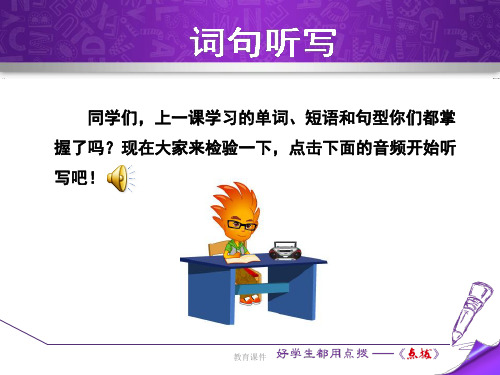
教育课件
5
讲解来自《点拨》
考向二 at the age of + 数字 = at age+数字,还可表
示为when...was...years PPT模板:/moban/ PPT背景:/beijing/ PPT下载:/xiazai/ 资料下载:/ziliao/ 试卷下载:/shiti/ PPT论坛: 语文课件:/kejian/yuw en/ 英语课件:/kejian/ying yu/ 科学课件:/kejian/kexu e/ 化学课件:/kejian/huaxue/ 地理课件:/kejian/dili/
教育课件
9
讲解来自《点拨》
知识点 3 discover /dɪs'kʌvə/ v.发现;了解 考向【易错点】辨析discover和 inveover “发现;了解”,表示发现原来就有的物品。 invent “发明;创造”,表示发明一件新事物。
eg:Who discovered coal? 谁发现了煤? Edison invented the bulb.爱迪生发明了电灯泡。
1.What country did Marco Polo come from? Italy.
2.How did he and his brother travel? They travelled on boats, horses and camels.
3.How long did his journey last? It lasted about twenty years.
□twenty
√□seventeen
□sixteen
2.Marco Polo and his father moved goods between ________
八年级英语上册课件《Unit 9 (Section B 3a-Self Check)》
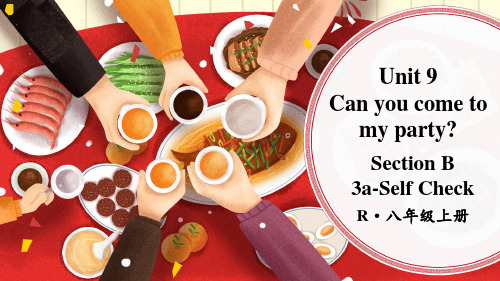
• Do you know how to write an invitation by e-mail? • What’s the format of an e-mail?
3a Look at the format of an e-mail.
Greeting
Body
1.电子邮件书写时,向左侧顶格 2.称谓常用Dear+姓、Dear Sir/ Madam… 3.正文通常控制在两三段以内,层次清晰,语言简洁
5. talk on Wechat or QQ • What methods are formal if you want to invite sb?
1. e-mail 2. writing on paper Generally speaking, writing an e-mail or letter is a formal(正式的) method of invitation.
How to organize the body of your e-mail?
Dear Parents, I would like to invite you to the opening of our new library at No.9 High School.
Q:what does the first two sentences tell us?
句型拓展
I’d like to invite… to…( a kind of party) My birthday is … The party will begin at … in … The party will be on the evening of …
Q:HWohwatmaarne ythpeatrhtsreceanpawrtesdaibvoiduet(划sep分ar)attheelyr(e分st别in地to?)?
新概念英语第二册 Lesson 8课件

巧记: 特殊形式比较级 共有三对二合一 坏病两多并两好 little意思不是小 一分为二有两个 一是老来二是远
比较级的用法 比较级+than 原级比较 as…as
她和他一样胖。
She is as fat as he.
她不如他胖。
She is not as fat as he.
他比她胖。
He is fatter than she.
漂亮的
更漂亮的
最漂亮的
interesting——more interesting——most interesting
有趣的
更有趣的
最有趣的
形容词比较级和最高级的构成——不规则变化
原级
good/ well 好的 bad/ ill 坏的 many/much 多的 little 少的 far 远的
old 老的
adj.木头的
5.pool [puːl]
n.水池
petition n.比赛,竞争(正式)
eg. She came first in the beauty competition. 她在选美比赛中得了第一名。
a competition between/among 在...之间的比赛
compete v. [kəm'pi:t] compete against/ with sb 跟…竞争/比赛 eg. We can compete against anybody and we can win.
Lesson 8
The best and the worst Zoe
01
New Words
New Words
petition [kɒmpə'tɪʃ(ə)n] n. 比赛
科普版-英语-六年级上册-Lesson 8全课时教案
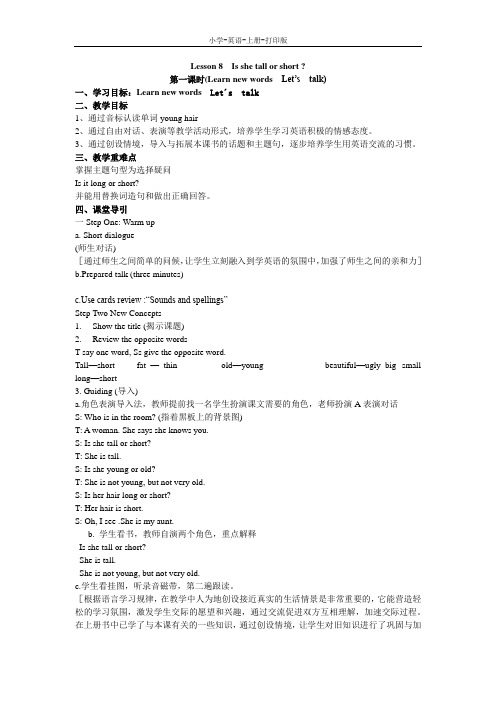
Lesson 8 Is she tall or short ?第一课时(Learn new words Let’s talk)一、学习目标:Learn new words Let´s talk二、教学目标1、通过音标认读单词young hair2、通过自由对话、表演等教学活动形式,培养学生学习英语积极的情感态度。
3、通过创设情境,导入与拓展本课书的话题和主题句,逐步培养学生用英语交流的习惯。
三、教学重难点掌握主题句型为选择疑问Is it long or short?并能用替换词造句和做出正确回答。
四、课堂导引一Step One: Warm upa. Short dialogue(师生对话)[通过师生之间简单的问候,让学生立刻融入到学英语的氛围中,加强了师生之间的亲和力]b.Prepared talk (three minutes)e cards review :“Sounds and spellings”Step Two New Concepts1. Show the title (揭示课题)2. Review the opposite wordsT say one word, Ss give the opposite word.Tall—short fat —thin old—young beautiful—ugly big--small long—short3. Guiding (导入)a.角色表演导入法,教师提前找一名学生扮演课文需要的角色,老师扮演A表演对话S: Who is in the room? (指着黑板上的背景图)T: A woman. She says she knows you.S: Is she tall or short?T: She is tall.S: Is she young or old?T: She is not young, but not very old.S: Is her hair long or short?T: Her hair is short.S: Oh, I see .She is my aunt.b. 学生看书,教师自演两个角色,重点解释Is she tall or short?She is tall.She is not young, but not very old.c.学生看挂图,听录音磁带,第二遍跟读。
新2 Lesson8
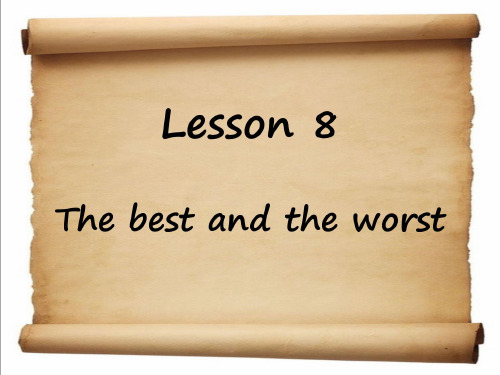
2.match 一般指代表队之间的大型的公开比赛,对抗性体
育运动。尤指球类比赛; a football match 3.game 通常指为了娱乐或锻炼或不大正式、根据某种规
则以胜负为主的比赛,既可是体力的,亦可是脑 力的;Olympic Games , card game. petition 指对力量、技术能力的比赛
over the thieves.
他们对小偷们严加看管。
词组闯关
• 守卫:
keep guard
• 让某人吃惊的是:to one’s surprise
• 充满了,装满了:be full of…
• 一袋钻石:
a parcel of diamonds
• 一袋贵重的钻石:a valuable parcel of diamond
规则变化如下: 1) 加 -er 和 -est 。 small, smaller, smallest 2) 以 -e 结尾, 加 -r 和 -st 。 wide, wider, widest 3)重读闭音节,双写加 -er和-est。 big, bigger, biggest 4)以辅音加 -y 结尾,改-y为 –i, 加er 和-est 。
wooden['wudən]
adj. 木头的
pool [pu:l]
n. 水池
competition[kɔmpə 'tiʃən] n. 比赛
neat [ni:t] adj. 整齐的
path [pɑ:θ] n. 小路,小径
wooden['wudən] adj. 木头的
pool [pu:l]
n. 水池
Lesson_8_paraphrase
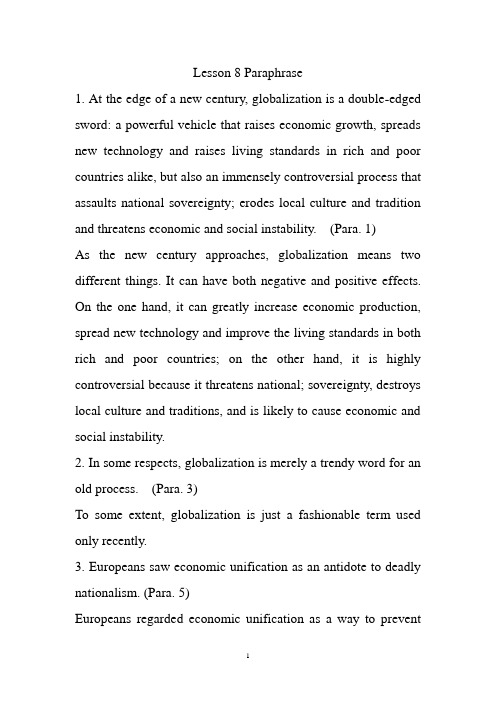
Lesson 8 Paraphrase1. At the edge of a new century, globalization is a double-edged sword: a powerful vehicle that raises economic growth, spreads new technology and raises living standards in rich and poor countries alike, but also an immensely controversial process that assaults national sovereignty; erodes local culture and tradition and threatens economic and social instability. (Para. 1)As the new century approaches, globalization means two different things. It can have both negative and positive effects. On the one hand, it can greatly increase economic production, spread new technology and improve the living standards in both rich and poor countries; on the other hand, it is highly controversial because it threatens national; sovereignty, destroys local culture and traditions, and is likely to cause economic and social instability.2. In some respects, globalization is merely a trendy word for an old process. (Para. 3)To some extent, globalization is just a fashionable term used only recently.3. Europeans saw economic unification as an antidote to deadly nationalism. (Para. 5)Europeans regarded economic unification as a way to preventnationalism.4. A decade later, even after Asia’s 1997—1998 financial crisis, private capital flows dwarf governmental flows. (Para. 8)Ten years later, even after Asia’s financial crisis of 1997—1998, private capital flows are still greater in number than governmental capital flows.5. The recent takeover struggle between British and German wireless giants is exceptional only for its size and bitterness. (Para. 10)The only difference between the recent takeover struggle between British and German radio giants and other cases is that this takeover is much bigger and a lot bitter.6. Behind the merger boom lies the growing corporate conviction that many markets have become truly global. (Para.11)The reason for the merger boom is that more and more business people now believe that many markets have truly become global. They are no longer producing just for the people in their own country. They want to combine or merge with others to become multinational companies.7. In Europe, the relentless pursuit of the “single market” is one indicator. This reflects a widespread recognition that Europeancompanies will be hard-pressed to compete in global markets if their local operations are hamstrung by fragmented national markets. (Para. 13)In Europe, the persistent and unremitting effort to turn all countries on the continent into a single market shows that there is a general agreement that if the European market remains divided into many small parts behind national borders, their companies will not be able to compete in the international market.8. Among poorer countries, the best sign of support is the clamor to get into the World Trade Organization... And 32 are seeking membership. (Para. 14)Many poorer countries want to join the World Trade Organization. This shows that they support globalization.9. Meanwhile, Latin America and sub-Saharan Africa—whose embrace of the world economy has been late or limited—fared much less well. (Para. 17)Meanwhile, Latin America and sub-Sahara Africa, whose integration with the world economy has been late and limited, were not so lucky.10. The global economy may be prone to harsher boom-bust cycles than national economies individually. (Para. 19)Once integrated with the world market, nations will naturally be more vulnerable to the fluctuations of the world economy. The capital flows in and out of a country, for example, can create a boom or bust very quickly and with much harsher effects.11. The Asian financial crisis raised questions on both counts. (Para. 20)The Asian financial crisis brought these two questions to people’s attention: investment funds were not well used and trade flows became too lopsided.12. …it became apparent that as a result of “crony capitalism”, inept government policies and excess optimism, much of the investment had been wasted on unneeded factories, office buildings and apartments. (Para. 21)It became clear that because of the corruption in those countries where political and financial resources are in the hands of a few privileged people along with their dishonest friends, their foolish government policies and unreasonable optimism, much of the investment was wasted on unneeded factories and a real estate bubble.13. What prevented the Asian crisis from becoming a full-scale global economic downturn has been the astonishing U. S. economy. (Para. 22)It was the surprisingly vigorous growth of the U. S. economy that saved the Asian crisis from escalating into an all-round economic depression.14. If the forecasts materialize—and the OECD’s growth estimates for Japan exceed most private forecasts—they will restore some balance to the world economy and relieve fears of a global recession. (Para. 27)If the forecasts come true—and the OECD’s growth estimates for Japan are higher than most private forecasts—they will, to some extent, help the world economy return to its earlier balance, and reduce the fear of a worldwide recession.15. It remains possible that abrupt surges of global capital, first moving into Asia and then out, will have caused, with some delay, a larger instability. (Para. 28)It is still possible that sudden increase or withdrawal of the world’s capital, first moving into Asia and then out of it, will have made Asia more unstable.16. But this does not mean that a powerful popular backlash, with unpredictable consequences, is not possible. (Para. 33) But this does not mean that a powerful hostile reaction from ordinary people, which will have unpredictable consequences, is not possible.。
Lesson 8 形容词与副词的比较级和最高级 人教版英语暑假语法专题教案(七升八)

Lesson 8形容词与副词的比较级和最高级【内容提要】形容词与副词的比较级和最高级【知识要点回硕】1同级比较2比较级3最高级4形容词和副词的比较级和最高级的构成【考点突破】例1 Roy thinks he works as as his friend, Dan.A. hardlyB. harderC. hard[讲解] 本题考查同级比较。
hardly几乎不;harder是hard的比较级,表示“更努力的,更努力地”;hard努力的,努力地; more hardly是错误的表达。
此题为同级比较,用"as+adj./adv.+as"的结构, 又因为work是动词,所以用副词修饰,hard的形容词和副词形式不变。
[答案] C例2 Lisa was still very weak when she left hospital. But after a week's rest, she felt much and went back to school.A. goodB. betterC. worse[讲解] 本题考查形容词的比较级。
由but 可知休息了一个星期后,Lisa的身体变好了,所以排除C项和D项;此处与之前进行了比较,要用比较级的结构,而good的比较级是better.[答案] B例3 There will be cars in the city because people will prefer the subway.A. fewerB. lessC. more[讲解] 本题考查形容词变比较级的不规则变化。
由because people will prefer the subway可推测出汽车会越来越少,排除C项;fewer走few的比较级,修饰可数名词;less是little的比较级,修饰不可数名词:而car为可数名词,故用fewer。
[答案] A例4 The harder you study, the knowledge you will know.A. muchB. more C, little[讲解] 本题考查比较级“越...,越…”的结构。
新概念英语第二册lesson8(共28张PPT)
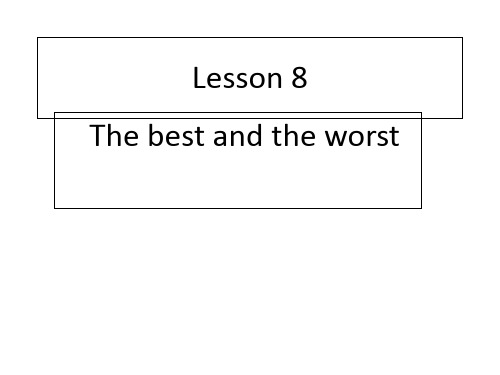
• 3、Patience is bitter, but its fruit is sweet. (Jean Jacques Rousseau , French thinker)忍耐是痛苦的,但它的果实是甜蜜的。10:516.17.202110:516.17.202110:5110:51:196.17.202110:516.17.2021
Let’s compare!
I am fat. I am fatter. I am the fattest.
Let's compare!
I am ill. I am worse.
I am the worst.
•
9、要学生做的事,教职员躬亲共做; 要学生 学的知 识,教 职员躬 亲共学 ;要学 生守的 规则, 教职员 躬亲共 守。20 21/8/1 12021/ 8/11We dnesda y, August 11, 2021
11, 2021
• 2、Our destiny offers not only the cup of despair, but the chalice of opportunity. (Richard Nixon, American President )命运给予我们的不是失望之酒,而是机会之杯。二〇二一年六月十七日2021年6月17日星期四
•
Let's compare!
I am happy. I am
happier.
I am the happiest.
New words and expressions
petition n.比赛,竞赛。 与它有类似意义的还有match, game, race这些词. 下面我们来把这些词对比一下。 competition主要指智力与脑力的一些竞赛,强调对
lesson-8朗文-新概念靑少版3A
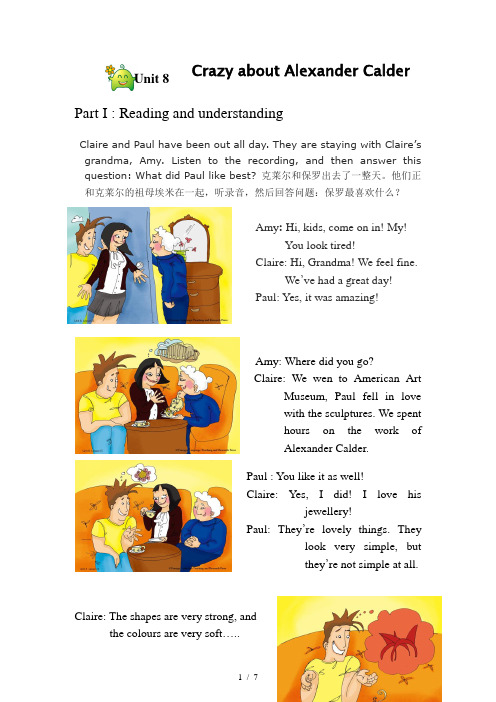
Crazy about Alexander Calder Unit 8Part I : Reading and understandingClaire and Paul have been out all day. They are staying with Claire’s grandma, Amy. Listen to the recording, and then answer this question: What did Paul like best? 克莱尔和保罗出去了一整天。
他们正和克莱尔的祖母埃米在一起,听录音,然后回答问题:保罗最喜欢什么?Amy: Hi, kids, come on in! My!You look tired!Claire: Hi, Grandma! We feel fine.We’ve had a great day!Paul: Yes, it was amazing!Amy: Where did you go?Claire: We wen to American ArtMuseum, Paul fell in lovewith the sculptures. We spenthours on the work ofAlexander Calder.Paul : You like it as well!Claire: Yes, I did! I love hisjewellery!Paul: They’re lovely things. Theylook very simple, butthey’re not simple at all.Claire: The shapes are very strong, andthe colours are very soft…..Paul: Anyway….his hanging sculptures were thebest for me!Paul: There was one huge one, called‘Big Red’. It was made of triangularpieces, like feathers. The pieceswere made of aluminium. Theylooked heavy, but they were light!Paul: We blew on one little disc, andthe whole thing moved.Claire: Yeah, that was cool! All thepieces moved around, like anative indian headdress.Part II : wordssculpture n.雕塑jewellery n.珠宝,首饰simple adj.简单点shape n.形状soft adj.柔和的hanging adj.悬挂的triangular adj.三角形的aluminium n.铝native indian 印第安人headdress n.头饰art gallery n.美术馆recently adv. 近来painting n.图画,油画Part III: speakingPatterns:A: This car’s old.B: Really? It doesn’t look old. It looks new.A: Is that a stone statue?B: Yes, it’s made of stone, I’m sure. It feels smooth.59 60car bandlooks new / sounds old looks great / sounds terrible 61 62food milksmells good / tastes horrible smells fresh / tastes sour63 64meat coffeelooks all right / smells terrible smells delicious / tastes awful65 66 67 68It feels smooth hard warm heavy It’s made of stone wood wool metal It’s stone statue a wooden chair a woollen scarf metal boxWritten Exercises1. Complete these sentences, using the notes in brackets. Then look at the text in Lesson 15.1) We…..( a great day)!____________________________________________________ _2) Paul…….( in love / sculptures)____________________________________________________ _3) They look…..(simple / not simple)____________________________________________________ _4) Anyway……(hanging sculptures / best for me)____________________________________________________ _5) We blew…..(one little disc / thing moved)____________________________________________________ _2. Write complete answers to these questions about the text in Lesson 13, to make one paragraph.1)Have Claire and Paul had a terrible day or a great one?2)Where did they go? What did they spend hours on? (….and…..)3)What did Paul fall in love with? What did Claire love? (……,but….)4)What are the best for Paul?5)What was the huge ‘Big Red’ sculpture made of?6)What are they made of? Did they look right or heavy? Were they lightor heavy? (……and….., but……)7)Did Paul and Claire touch one little disc or blow on it? What happenedto all the pieces? (…, and)____________________________________________________ _____________________________________________________ _____________________________________________________ _____________________________________________________ _____________________________________________________ _____________________________________________________ _____________________________________________________ _____________________________________________________ _____________________________________________________ _____________________________________________________ _____________________________________________________ _____________________________________________________ _3. Listen to the recording, and answer the questions about the text.Art ….or something else?1)How big is the rabbit?_____________________________________________________2)What is it made of?____________________________________________________ _3)Where is it?____________________________________________________ _4)How long has it been there?____________________________________________________ _5)Does it look good? Does it smell sweet?____________________________________________________ _6)Is it ‘art’? What do you think?____________________________________________________ _4 Write good questions for the answers, like the example.Example: What’s that man talking about?That man? He isn’t really talking about anything!1)__________________________________________________Well, it smells nice, but it tastes awful!2)__________________________________________________No, it isn’t very strong. It’s made of paper, I think.3)__________________________________________________It looks very easy, but it’s quite difficult.4)__________________________________________________They look good, I know, but they sound terrible.5)__________________________________________________No, have you looked everywhere for them? Are you sure?6)__________________________________________________No, I don’t think so. I can’t see anybody in the garden,7)__________________________________________________I have just had some, thank you. It tastes great.8)__________________________________________________She’s taught English for about five years.5. Choose the correct answers to fill the blank.1) Where did you go? We_____ to the Amerivan Art Museum.a) go b) gone c) went d) going2) They look very simple, but they’re not simple______.a) thing b) at all c) all d) work3) Anyway….his hanging sculptures_____ the best for me!a) was b) has been c) were d) is4) The pieces were made_____ aluminium.a) of b) out c) to d) for5) All the pieces moved around, _____ a native indian headdress.a) for b) as c) so d) like[文档可能无法思考全面,请浏览后下载,另外祝您生活愉快,工作顺利,万事如意!]。
Lesson 8 课时作业-2022-2023学年冀教版英语七年级下册
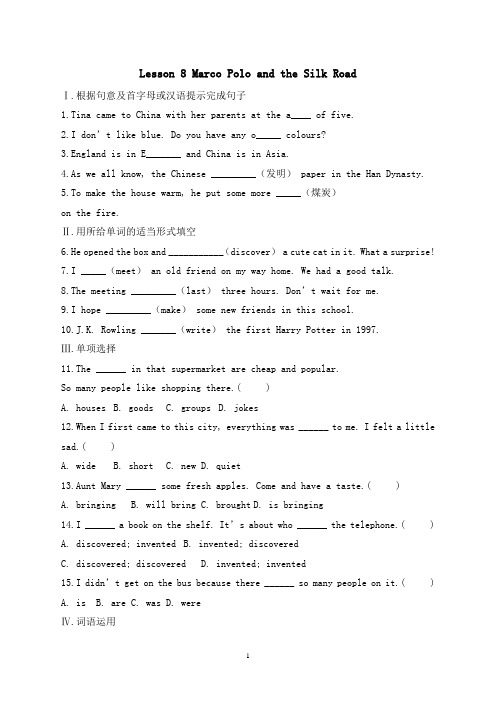
Lesson 8 Marco Polo and the Silk RoadⅠ.根据句意及首字母或汉语提示完成句子1.Tina came to China with her parents at the a____ of five.2.I don’t like blue. Do you have any o_____ colours?3.England is in E_______ and China is in Asia.4.As we all know, the Chinese _________(发明) paper in the Han Dynasty.5.To make the house warm, he put some more _____(煤炭)on the fire.Ⅱ.用所给单词的适当形式填空6.He opened the box and ___________(discover) a cute cat in it. What a surprise!7.I _____(meet) an old friend on my way home. We had a good talk.8.The meeting _________(last) three hours. Don’t wait for me.9.I hope _________(make) some new friends in this school.10.J.K. Rowling _______(write) the first Harry Potter in 1997.Ⅲ.单项选择11.The ______ in that supermarket are cheap and popular.So many people like shopping there.( )A. housesB. goodsC. groupsD. jokes12.When I first came to this city, everything was ______ to me. I felt a little sad.( )A. wideB. shortC. newD. quiet13.Aunt Mary ______ some fresh apples. Come and have a taste.( )A. bringingB. will bringC. broughtD. is bringing14.I ______ a book on the shelf. It’s about who ______ the telephone.( )A. discovered; inventedB. invented; discoveredC. discovered; discoveredD. invented; invented15.I didn’t get on the bus because there ______ so many people on it.( )A. isB. areC. wasD. wereⅣ.词语运用阅读下面短文,在空白处填入一个适当的单词(有提示词的,填入所给单词的正确形式)。
新概念英语青少版 b unit8
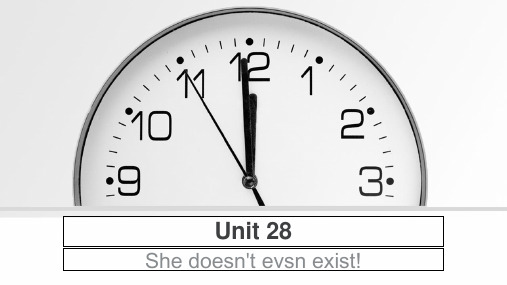
adj. 令人兴奋的
powerful
adj. 强大的
comfortable adj.舒服的
reliable adj.可靠的,可信赖的
stage
n. 舞台
Pattern Practice
not with picture J,N and R 1. A: Is Jane intelligent?
B: Well, she’s more intelligent than Frank. A: Is she hard-working? B: She’s less hard working than Frank.
Lesson 56
New words and Expressions: intelligent adj. 有才智的 hard-working adj. 努力工作的 opinion n. 观点,看法 think of v.+ prep. + object 想起 popular adj. 受欢迎的
exciting
carefully 小心地
careless 粗心的;无忧无虑 的;淡漠的
Lesson 55
detective e.g. We all love Arthur Conan Doyle's classic detective novel.
Lesson 55
martial arts master e.g. In Tienjin, there was a famous martial arts master.
Lesson 55
computer game e.g. Most of people like computer game. e.g. I have tired of these computer games.
新概念青少版1b课后听力原文

对于学习英语的孩子们来说,新概念英语青少版1b课后听力原文是非常重要的学习资料。
在这本教材中,孩子们可以通过听力练习来提高他们的英语听力能力,同时也可以巩固课堂上所学的知识。
以下是新概念英语青少版1b课后听力原文的内容:1. Lesson 1Text:A: Excuse me, are you Mr. King?B: Yes, I am.A: Do you teach English?B: Yes, I do. I teach it at No. 15 Middle School.A: I’m a student at that school. I’m in Class 2, Grade 2.B: Oh, really?A: Yes, I’m very glad to meet you.B: Nice to meet you, too.2. Lesson 2Text:A: What’s your name?B: My name is Wang Fei.A: How old are you?B: I’m twelve. And you?A: I’m twelve, too.B: Are you in Class 4, Grade 1?A: No, I’m not. I’m in Class 2, Grade 2. What’s your phone number?B: It’s xxx.3. Lesson 3Text:A: Hello, my name’s M iss Green.B: How do you do? My name is Alice White.A: I like your name. Are you a new student here?B: No, I’m not. I’ve been here for two years. And you?A: I’ve been here for three years. Nice to meet you.B: Nice to meet you, too.4. Lesson 4Text:A: Good evening, Miss King.B: Good evening, Class 2.A: Sit down, please.B: Thank you, Miss King.以上就是新概念英语青少版1b课后听力原文的内容。
- 1、下载文档前请自行甄别文档内容的完整性,平台不提供额外的编辑、内容补充、找答案等附加服务。
- 2、"仅部分预览"的文档,不可在线预览部分如存在完整性等问题,可反馈申请退款(可完整预览的文档不适用该条件!)。
- 3、如文档侵犯您的权益,请联系客服反馈,我们会尽快为您处理(人工客服工作时间:9:00-18:30)。
Lesson Eight1. M: Did you know that Arthur has three brothers living on three different continents?W: He must get an incredible (=unbelievable) phone bill every month.Q: What does the woman imply about Arthur?2. M: This calculator isn't working right.W: I think you've got the battery in upside down (把电池装反了).Q: What does the woman mean?3. W: We should buy a good guide book and study it before our trip to Montreal (蒙特利尔(加拿大)). M: We should. But they are so overpriced (=too expensive). What about the library?Q: What does the man imply?4. W: I always want a little something to eat about this time of day.M: So do I. Let's have a snack(点心) now and then have a light lunch later.Q: What are the speakers discussing?5. M: I've just been over to my friend Tom's new apartment. It's much bigger than my place.W: But more expensive I bet.Q: What does the woman mean?6. M: Prof. Parker, maybe you'd better find another actor to play this role. The lines (台词) are so long, sometimes I just completely forgot them.W: Look, Mike. It's still a long time before the first show and I don't expect you to know all the lines yet. Just keep practicing and I'm sure you'll get them.Q: What does the woman suggest the man do?7. M: Come on, Kate. The sun is shining, the flowers are blooming, maybe you're missing the point of (失去……的意义) life.W: Maybe you're missing the point of this chemistry study group.Q: What does the woman mean?8. W: Could you give me a ride (送某人一程) to the engineering building?M: I would, but I'm late for an appointment on the other side of town.Q: What does the man mean?9. W: Excuse me, Professor. Since class is cancelled (取消) on Thursday, when are we going to have the quiz?M: It will be postponed (推迟) until next week's class.Q: What does the man mean?10. W: I can't believe I still have this pain in my back. This medicine the doctor gave me was supposed to make me feel better by now.M: Maybe you should start taking it three times a day, like you were told.Q: What does the man suggest the woman do?11. M: I'm not sure what I'm in the mood for (有意做某事/有做某事的心情). Pizza and hamburger, they're both really good here,W: Oh, the movie starts in an hour, and we still have to go there and park, so just make a decision.Q: What does the woman suggest the man do?12. M: The basketball team is in the playoff s (进入季后赛): and I don't have a ticket. I guess I'll just watch it on TV. Do you want to come over?W: Actually, I have a ticket, but I'm not feeling well. You can have it for what it costs me.Q: What does the woman mean?13. M: Don't you ever go home? Every time I see you, you're here in the library por ing over (注视,凝视) your books.W: What do you mean? I thought this was home.Q: What can be inferred about the woman?14. M: Doctor, I haven't been able to get to sleep lately and I'm too tired to concentrate during classes.W: Well, you know, spending too much time indoors with all that artificial lighting can make you ill. Your body loses track of (不了解某人的情况/某事的动态) whether it's day or night.Q: What does the doctor imply the man should do?15. M: I'm having trouble drawing the model's right arm. It's supposed to look like he is pointing at me.W: To get the perspective (视角) you want, you need to use what we call "foreshortening " (按照透视法缩短(描绘对象)). Here, give me your pencil.Q: What will the woman probably do next?Passage Ⅰ:TaxThere are many different kinds of taxes paid in the US. The most common tax is sales tax When someone buys something, he pays the price of his purchase plus a small additional percentage. This percentage is the sales tax. The revenue from the sales tax goes to the state government to help pay for public schools, public safety, roads, parks and benefits for the poor. Each state sets its own tax percentage. Some states are considerably lower than others. In some states there is no sales tarnA second type of tax is income tax. This tax is a percentage of all the money earned by a family each year. Americans pay. income taxes to the federal government which uses the revenue for national expenses such as defense, help for the needy and other public services. Some states also have a state income tam Income tax, like other taxes, is usually graduated. This means the tax percentage increases as a family's income increases.A third kind of tax is property tax. This tax is paid by anyone who owns land or a house. The amount of the tax is based on the property's value. The revenue from this tax goes to the local governments for schools and community services. In addition people must pay luxury tax when they purchase certain things such as cigarettes and alcoholic beverages.A fifth kind of tax is inheritance tax. When someone dies, usually his family inherits the dead person's wealth and property. However, those who inherit must pay a percentage of this wealth to the government as an inheritance tax.As we have heard, there are five kinds of taxes that Americans pay. Most Americans don't want any more taxes.1. Which of the following is the most common tax?2. "The income tax is usually graduated." What does the sentence mean?3. What is the amount of property tax based on?4. What is the revenue from sales tax used for?5. Where does the revenue from income tax go?1) small additional percentage,2) buying something,3) all the money earned,4) owns land or a house,5) purchase certain things,6) inherits the wealth and propertyPassage Ⅱ:ReligionThe freedom to choose his or her own religious faith and to worship according to individual conscience is the right of every American. The first amendment to the Constitution of the United States says: "Congress shall make no law respecting the establishment of religion, or prohibiting the free exercise thereof .... "Americans in every state have the same freedom to worship.One of the biggest increases in church membership in the United States occurred between 1950 and 1970. Today about 60 of every 100 Americans are members of a church or temple ... only nine percent say they are not religious at all.The country's 219 religious denominations are organized into more than 341,000 local congregations. Protestants outnumber other religious groups: 76. 8 million list themselvesas Protestants, while 52 million are Roman Catholics, 3.9 million are members of the Jewish Faith, and four million are in the Eastern Orthodox church.Both children, more than 45 million of them, and adults attend classes in religious study provided by various religious groups. No public educational institution can give religious instruction, because of the constitutional separation of church and state. But this does not preclude teaching the history of religion and related courses in many schools. Each week, too, radio and television programs of a religious nature are presented by the various faiths. And the Bible remains one of the most popular books in America, about nine million are sold or distributed each year.Support of the churches and synagogues comes from voluntary donations by their members. The government gives no direct subsidy to any faith.1. What does the first amendment to the Constitution say about religion?2. According to the passage, what happened between 1950 and 1970?3. What percentage of Americans are members of churches in America?4. By whom are classes in religious study provided?5. Where does support of the churches come from?1) 76.8 2) 52 3) 3.9 4) 4passage III: Health InsurancePart D Extensive ListeningHalloween Again1) October,2) Candy,3)customer,4) toy,5) Superman,6) Eighty-four percent,7) disguise,8) ordinary life9) change10) average11)favorite12) 40013) weekends14)popularity15)decorate16)Quarter17) Eight18) sure thing19) point of view20) grow out of it。
